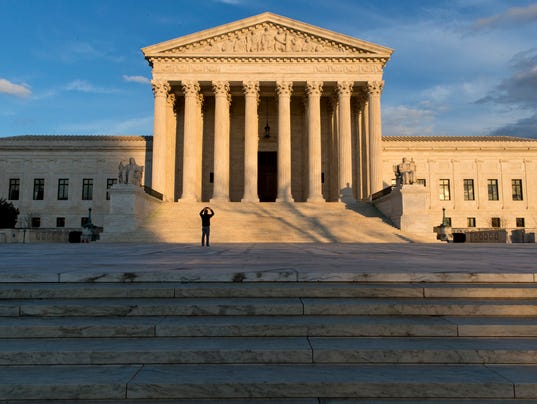 R
R
JUSTICES DIVIDED OVER JURY RACISM
US Supreme Court: Racism can upend jury verdicts
WASHINGTON — Racism in jury deliberations is so pernicious that verdicts can be thrown out even following convictions, a divided Supreme Court ruled Monday.
A majority of justices said a Colorado man accused of sexual battery may deserve a new trial because a juror made discriminatory comments about Mexicans such as him during private deliberations. The comments were revealed by fellow jurors only after the verdict was in.
“Racial bias implicates unique historical, constitutional, and institutional concerns,” Justice Anthony Kennedy, joined by the court’s four liberal justices, wrote. “An effort to address the most grave and serious statements of racial bias is not an effort to perfect the jury but to ensure that our legal system remains capable of coming ever closer to the promise of equal treatment under the law that is so central to a functioning democracy.”
It was a close call — the court ruled 5-3 in the defendant’s favor — because state and federal rules seek to protect jury verdicts from being questioned after the fact, based on the sanctity of the jury room. “The court not only pries open the door; it rules that respecting the privacy of the jury room, as our legal system has done for centuries, violates the Constitution,” Justice Samuel Alito wrote in dissent, joined by Chief Justice John Roberts and Justice Clarence Thomas. “This is a startling development, and although the court tries to limit the degree of intrusion, it is doubtful that there are principled grounds for preventing the expansion of today’s holding.” Thomas went further in a separate dissent, arguing that the majority ruling violates the original understanding of the 6th and 14th Amendments. “In its attempt to stimulate a ‘thoughtful, rational dialogue’ on race relations, the court today ends the political process and imposes a uniform, national rule,” he wrote. “The Constitution does not require such a rule. Neither should we.”
Several justices had expressed concern during oral argument in October that allowing new trials because of racial discrimination could lead to other challenges over religion, gender, sexual orientation — even a defendant’s political party or driving skills. But Kennedy ruled that race is different from prior legal challenges involving private jury deliberations, such as a case in which several jurors were found to be inebriated. “All forms of improper bias pose challenges to the trial process. But there is a sound basis to treat racial bias with added precaution,” he said. “A constitutional rule that racial bias in the justice system must be addressed — including, in some instances, after the verdict has been entered — is necessary to prevent a systemic loss of confidence in jury verdicts.”
Jeffrey Fisher, the lawyer for Miguel Angel Peña-Rodriguez, argued in October that that “racial bias is never the lesser evil” among competing interests. “Race is a particular poison,” he said.